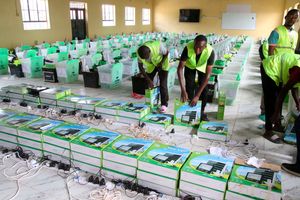Premium
Covid-19 fight undoing gains made in HIV war, ministry says

What you need to know:
- The number of coronavirus infections continues to rise, with the country recording an additional 667 new cases from 5,075 samples on Friday.
- Gains made in preventing mother-to-child transmission could be also reversed, raising new HIV infections among children by as much as 104 per cent, the model shows.
Interruption of access to antiretroviral (ARV) drugs as a result of the war on Covid-19 may undo the gains the country has made in fighting HIV/Aids.
Kenya is inching closer to the global target of testing, treating and suppressing HIV/Aids in 90 per cent of its population.
However, many hospitals have recorded a drastic drop in the number of people showing up for their drug supplies, with the Ministry of Health noting a decline to refill medications.
“There is a 30 per cent drop in HIV clinic visits,” Health Chief Administrative Secretary Mercy Mwangangi said during the Covid-19 briefing yesterday.
She added that March and April recorded the worst and lowest uptake of HIV services, with testing volume reducing by 33 per cent.
Clinic visits and community testing have reduced by 71 per cent and facility testing dropped by 28 per cent, Dr Mwangangi said.
The number of coronavirus infections continues to rise, with the country recording an additional 667 new cases from 5,075 samples on Friday.
HIGHEST DROP
The total number of the cases rose to 16,268 from a cumulative sample of 266,102.
Identifying mothers with HIV is falling, with the highest drop recorded in April.
The number of patients being enrolled for treatment has also reduced. “Data shows that 83 per cent of HIV+ patients have been identified, with 87 per cent enrolled for treatment,” she said.
“Ninety three per cent of those enrolled have achieved the viral load suppression.”
Dr Mwangangi added that the number of HIV/Aids patients placed in care has gone down, thus interfering with the achievement of viral suppression in those taking the drugs.
The concern around access to HIV medication and services is not limited to Kenya.
The World Health Organization (WHO) says the number of deaths from Aids-related illnesses in Sub-Sahara could double if healthcare is disrupted during the coronavirus pandemic.
500,000 EXTRA DEATHS
In the worst-case scenario, a modelling group jointly convened by WHO and the United Nations Programme on HIV/AIDS (UNAIDS), shows that a six-month disruption of antiretroviral therapy could result in 500,000 extra deaths, setting the clock backward by more than a decade.
Gains made in preventing mother-to-child transmission could be also reversed, raising new HIV infections among children by as much as 104 per cent, the model shows.
The UN health agency says even as governments focus on controlling the spread of Covid-19, they need to prevent interruptions of access to ARVs.
“We must read this as a wake-up call to countries to identify ways to sustain vital health services. For HIV, some countries are taking important steps, ensuring that people can collect bulk packs of treatment,” WHO Director-General Tedros Adhanom Ghebreyesus said.
“We must also ensure global supplies of tests and treatment continue to flow to the countries that need them.”
UNAIDS Executive Director Winnie Byanyima said the Covid-19 pandemic must not be used as an excuse to divert investment from HIV/Aids programmes.





